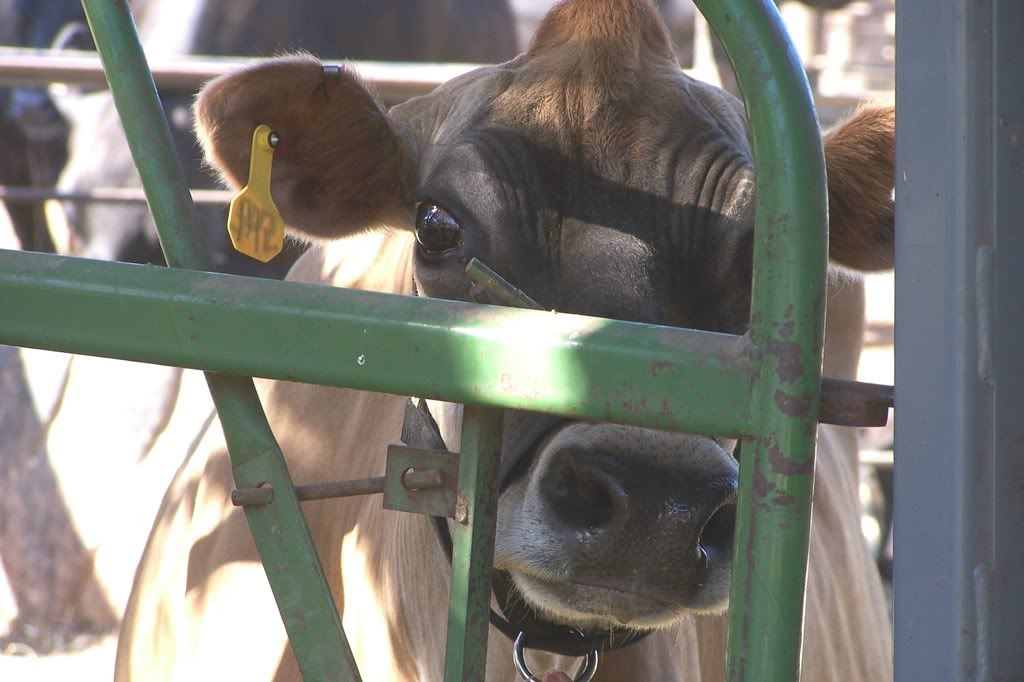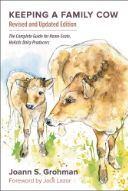Post by Deleted on Dec 12, 2011 11:29:49 GMT -5
Hello All;
I am new here. I'm in my early twenties, recently graduated college with my BS in Animal Science. I was raised around horses (we have 10) and a small family farm. I got into dairy cows during my freshman year of college and greatly enjoy fitting, showing, milking, etc. I currently work with a show string of dairy animals on a weekly basis and during the summer months; show quite frequently. I am no stranger to dairy cows but i have never personally owned one so the ownership part is a bit new to me.
all the dairy cows i have ever been around are fed a corn sileage ration with occasional hay.
To make a long story short; i am retiring a registered jersey cow to my family's farm after New Years. She was the first cow i ever showed and won anything with and she has a special place in my heart. She is coming 6 years old and comes from a very well-bred cow family. She lightly prolapsed a year ago in her last calving and they decided not to breed her back. She's never had mastitis. I am paying her beef price to bring her home (which is giving me a bit of a heart attack at the price ) because I just cant stand the thought of her going to McDonald's. They are drying her off in the next week or two. She is in excellent shape and has been well looked after.
) because I just cant stand the thought of her going to McDonald's. They are drying her off in the next week or two. She is in excellent shape and has been well looked after.
She is a very low-key, easy going cow. Loves attention, very personable. I have a small paddock with a nice run-in shed that will be her new home. In the summer we have a 3-4 acre pasture for her to roam in and feast out of. She has been on a primarily corn silage/grain ration diet with the occasional flakes of hay fed after night milkings.
We do not have access to corn silage so she will have to be on a hay/grain diet. We feed high quality first cutting hay at our farm (we have horses).
Any suggestions as to what to feed her for grain? I'd like to feed her a molassey type grain mixed with some kind of pellet? How much to feed her?
We live in New England and winter has just shown its ugly face about 3 days ago so she will need the molasses sugar to help her keep warm and healthy this winter. Would she still be on a 16% dairy ration even though she is a retired dry cow or should i consider feeding something else? all suggestions will be considered so please help me out
I can also feed her beet pulp if you think it would be a good idea for her.
Alfalfa pellets or soaked alfalfa cubes? Do you think its necessary?
I have access to three different feed sources. I have a nearby family owned grain store that sells Blue Seal brand and other assorted grains. I also have access to an Agway store. I also have access to a Tractor Supply. I'd like to stick with feed that is bagged as it is easier for me to get, store, and feed but i'd also like to refrain from running to 2-3 different stores a week to get what i need.
As for her main forage; she'll be getting high quality 1st cut hay AM & PM. It is grown in town and it is nice stuff. As noted above: i can also feed beet pulp and alfalfa cube/pellet if you think i should do so.
I'm going to put her on ProBios for a week or two when she comes here to help her in her transition. She has been a high quality production jersey cow her whole life and she's never spent a day outside; so this will be new for her.
I also heard that Kelp is a good choice to feed her. We feed our horses a brand of Kelp called SOURCE. It comes in huge buckets and it is a nutritional suppliment. I will have to check to see if we can feed it to a cow but this might be an easy source of kelp for her and a great addition to her daily diet.
our horses are also fed a small scoop of Blue Seal Sunshine Pellets with their PM feed. It is a high quality vitamin/mineral pellet. I can also do this for her if you think it would be a good idea. The Sunshine Pellet is not a strictly equine feed.
I am planning on putting a mineral salt block in her pasture. any other sources of minerals i should consider that are low maintenance??
She is going to retire and live out her days here but I am trying to keep her care low maintenance. The more low maintenance the better it is for us to tend to her.
I'm also not sure what routine vaccines dry/retired cows need but any suggestions? We use a primarily equine vet but we can also arrange to have a bovine vet care for her when needed
Like i said winter is here; the days are cold and the nights are colder. I'd like to make her transition a pleasant one and i'd like to support her immune system in the process. She is going to be living a very happy life
Anything else you'd like to add; please do!
Thanks for the help!
I am new here. I'm in my early twenties, recently graduated college with my BS in Animal Science. I was raised around horses (we have 10) and a small family farm. I got into dairy cows during my freshman year of college and greatly enjoy fitting, showing, milking, etc. I currently work with a show string of dairy animals on a weekly basis and during the summer months; show quite frequently. I am no stranger to dairy cows but i have never personally owned one so the ownership part is a bit new to me.
all the dairy cows i have ever been around are fed a corn sileage ration with occasional hay.
To make a long story short; i am retiring a registered jersey cow to my family's farm after New Years. She was the first cow i ever showed and won anything with and she has a special place in my heart. She is coming 6 years old and comes from a very well-bred cow family. She lightly prolapsed a year ago in her last calving and they decided not to breed her back. She's never had mastitis. I am paying her beef price to bring her home (which is giving me a bit of a heart attack at the price
 ) because I just cant stand the thought of her going to McDonald's. They are drying her off in the next week or two. She is in excellent shape and has been well looked after.
) because I just cant stand the thought of her going to McDonald's. They are drying her off in the next week or two. She is in excellent shape and has been well looked after.She is a very low-key, easy going cow. Loves attention, very personable. I have a small paddock with a nice run-in shed that will be her new home. In the summer we have a 3-4 acre pasture for her to roam in and feast out of. She has been on a primarily corn silage/grain ration diet with the occasional flakes of hay fed after night milkings.
We do not have access to corn silage so she will have to be on a hay/grain diet. We feed high quality first cutting hay at our farm (we have horses).
Any suggestions as to what to feed her for grain? I'd like to feed her a molassey type grain mixed with some kind of pellet? How much to feed her?
We live in New England and winter has just shown its ugly face about 3 days ago so she will need the molasses sugar to help her keep warm and healthy this winter. Would she still be on a 16% dairy ration even though she is a retired dry cow or should i consider feeding something else? all suggestions will be considered so please help me out

I can also feed her beet pulp if you think it would be a good idea for her.
Alfalfa pellets or soaked alfalfa cubes? Do you think its necessary?
I have access to three different feed sources. I have a nearby family owned grain store that sells Blue Seal brand and other assorted grains. I also have access to an Agway store. I also have access to a Tractor Supply. I'd like to stick with feed that is bagged as it is easier for me to get, store, and feed but i'd also like to refrain from running to 2-3 different stores a week to get what i need.
As for her main forage; she'll be getting high quality 1st cut hay AM & PM. It is grown in town and it is nice stuff. As noted above: i can also feed beet pulp and alfalfa cube/pellet if you think i should do so.
I'm going to put her on ProBios for a week or two when she comes here to help her in her transition. She has been a high quality production jersey cow her whole life and she's never spent a day outside; so this will be new for her.
I also heard that Kelp is a good choice to feed her. We feed our horses a brand of Kelp called SOURCE. It comes in huge buckets and it is a nutritional suppliment. I will have to check to see if we can feed it to a cow but this might be an easy source of kelp for her and a great addition to her daily diet.
our horses are also fed a small scoop of Blue Seal Sunshine Pellets with their PM feed. It is a high quality vitamin/mineral pellet. I can also do this for her if you think it would be a good idea. The Sunshine Pellet is not a strictly equine feed.
I am planning on putting a mineral salt block in her pasture. any other sources of minerals i should consider that are low maintenance??
She is going to retire and live out her days here but I am trying to keep her care low maintenance. The more low maintenance the better it is for us to tend to her.
I'm also not sure what routine vaccines dry/retired cows need but any suggestions? We use a primarily equine vet but we can also arrange to have a bovine vet care for her when needed
Like i said winter is here; the days are cold and the nights are colder. I'd like to make her transition a pleasant one and i'd like to support her immune system in the process. She is going to be living a very happy life
Anything else you'd like to add; please do!
Thanks for the help!



 Next winter you likely won't need to blanket her at all, as long as she has a place to get out of the wind.
Next winter you likely won't need to blanket her at all, as long as she has a place to get out of the wind.
